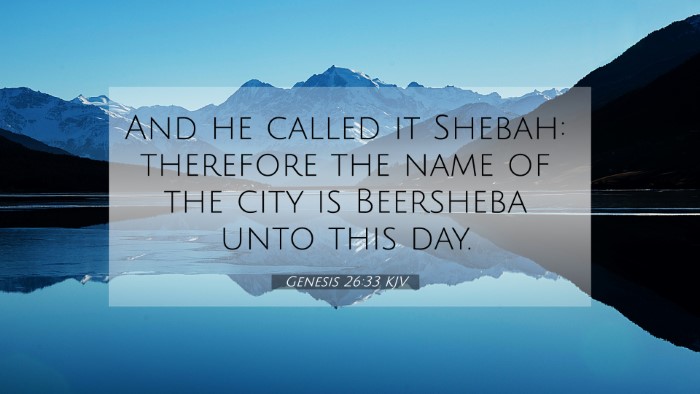Understanding Genesis 26:33
Genesis 26:33 states, "And he called it Shebah: therefore the name of the city is Beersheba unto this day." This verse marks the conclusion of a significant event in the life of Isaac, highlighting the importance of the well he dug, which served not only as a crucial water source but also as a symbol of God's promises and presence in Isaac's life.
Context and Importance
This verse occurs within the narrative of Isaac's encounters with the Philistines, particularly King Abimelech. After Isaac reopens the wells of his father Abraham and faces disputes over water rights, the discovery of a new well signifies a divine favor that brings peace and prosperity.
Exegesis from Commentaries
-
Matthew Henry:
Henry emphasizes Isaac's diligence in seeking peace in his dealings with the Philistines. The naming of Shebah, which means "oath" or "seven," signifies a covenantal aspect, reflecting the idea that divine promises are fulfilled amid human interactions.
-
Albert Barnes:
Barnes elaborates on the significance of the name Beersheba, which literally means "well of the seven." He points out that this denotes the oath made between Isaac and Abimelech, representing a turning point in their relationship characterized by mutual respect and acknowledgment of God’s hand in Isaac’s prosperity.
-
Adam Clarke:
Clarke notes the geographical and historical importance of Beersheba, a key site that encapsulates the struggles and blessings of the patriarchs. He suggests that the well symbolizes spiritual abundance from God, serving as a reminder of the covenant established with Abraham and now passed on to Isaac.
Key Themes
-
Divine Promises:
The well signifies God’s providence and His faithfulness in fulfilling the promises made to the patriarchs.
-
Conflict and Resolution:
This event illustrates the broader theme of conflict resolution between Isaac and the Philistines, underscoring the importance of peacemaking.
-
Identity and Legacy:
The renaming of the location highlights the ongoing legacy of faith and promise in Isaac's lineage.
Bible Cross References
Overall, Genesis 26:33 connects to several significant scripture passages that develop understanding through comparative Bible verse analysis:
- Genesis 21:31 - The establishment of Beersheba’s name relating to an oath between Abraham and Abimelech.
- Genesis 12:8 - The connection to Abraham’s earlier travels through the area and his acts of worship.
- Genesis 18:1 - Discussing the visitation by the Lord, highlighting the divine presence in physical locations.
- Genesis 26:24 - God’s reassurance to Isaac amidst fears and uncertainties.
- Matthew 5:9 - The blessing on peacemakers, echoing Isaac’s peacemaking efforts with the Philistines.
- Hebrews 11:9-10 - Referencing the faith of Abraham and Isaac in relation to the promises of God which encourage believers today.
- Exodus 33:15 - Seeking God's presence parallels Isaac's experience of God in his journey.
Applying Genesis 26:33
Understanding this verse within its context encourages believers to recognize God’s faithful provision during times of trial and conflict. If you seek themes of peace, faith, and divine promise, consider how these resonate within your own life and relationships.
Conclusion
Genesis 26:33 serves as a tangible reminder of God’s enduring promises and His willingness to establish peace among His people. Through the interpretive tools available in comprehensive Bible cross-reference materials, you can delve deeper into the significance of this and other verses, uncovering the rich inter-Biblical dialogue that connects throughout scripture.




